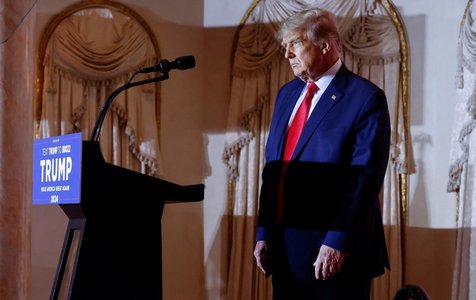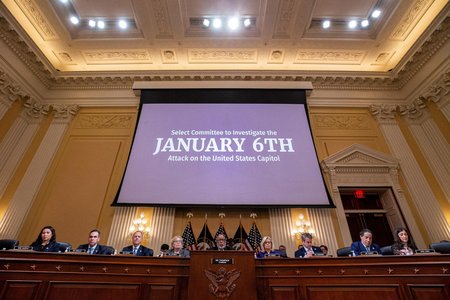Defending democracy abroad was front and center in the nation’s capital this week. On Wednesday, Ukraine's President Volodymyr Zelenskyy made a wartime visit to Washington. During a meeting at the White House, President Biden pledged to supply Ukraine with the highly sophisticated Patriot missile system. That evening, Zelenskyy addressed Congress which later approved more U.S. aid for Ukraine.
Clip: How Zelenskyy's trip to Washington impacts future debate over aid
Dec. 23, 2022 AT 8:39 p.m. EST
TRANSCRIPT
Notice: Transcripts are machine and human generated and lightly edited for accuracy. They may contain errors.
Yamiche Alcindor: Meanwhile this week, as we're talking about all the things that were going on here at home, defending democracy abroad was also front and center in the nation's capital. On Wednesday, Ukraine's President Volodymyr Zelenskyy made a wartime visit to Washington during at the White House. President Biden pledged to supply Ukraine with the highly sophisticated Patriot missile system. That evening, Zelenskyy also addressed a joint meeting of Congress. So, Seung Min, you've have great new reporting out. You went through all the details of how we ended up getting this meeting. So, break down your reporting for us. Why was Zelenskyy here now? Did he achieve what he came to achieve?
Seung Min Kim: So, this idea had been tossed around for months both on Capitol Hill, among the congressional leaders. Pelosi has talked with other members of the so-called big four about when the security situation is right, the idea of bringing President Zelenskyy to Congress, to address Congress. And this is also an idea that administration officials had talked about for some time. A U.S. official told me that Biden and Zelenskyy had talked about a meeting. So, in that December 11th phone call between the two leaders, President Biden, feeling that the security situation was okay, asked him, if you still want to come, we would be happy to host you. And that was when President Zelenskyy said, the time is now right, I want to come. And once that December 11th phone call happened, this all proceeded very quickly. It was confirmed about a week later in terms of being able to bring him to Washington. And, of course, security was very paramount for President Zelenskyy and he had the cover, he had the protection of the U.S. government from the moment he left Ukraine and came to the U.S. He was on a U.S. Air Force jet when he arrived at Joint Base Andrews just outside Washington. He was accompanied by the U.S. ambassador. He was traveling in a U.S. embassy vehicle as he went through Poland, which is where he got on the airplane and then came here to Washington and had all sorts of protection while he was here. But he really delivered a powerful message when he was standing alongside Biden and when President Biden continued to pledge U.S. support for the efforts in Ukraine. And I thought his remarks on Capitol Hill, while they were certainly to the broader Congress, it really did seem aimed at House Republicans at many parts during the speech. We know that there is a growing faction of Republicans on Capitol Hill, mostly in the House, but in some in the Senate as well, who are getting more and more skeptical of this continued Ukraine aid. And there was a line that we played earlier where he said your money is not charity. It's basically an investment in global security and democracy. It's being handled appropriately. And that is him trying to make the case that what Congress is doing in terms of continuing to funnel aid really matters for the global community writ large.
Yamiche Alcindor: And what's been impact, do you think, of his visit both on President Biden, who's been reluctant at times to give him all the weapons he wants but also on those Republicans that you said are wondering whether or not they want to continue to give aide to Ukraine?
Seung Min Kim: For President Biden, it really closes out the calendar year, these past eight months, showing to the world that the country remains united alongside Zelenskyy and alongside Ukraine. And it's a powerful image a powerful and signal that administration officials tell me they wanted to send particularly as the fighting gets more tough, as the winters comes. And for Congress, I'm not sure that what Zelenskyy said, as powerful as it was, changed much minds. Like you had House Republicans either who attended the joint session or who did not, come out and say, we still want more oversight of the money. We want to see inspectors general. We don't understand why we're spending U.S. taxpayer dollars abroad and my constituents don't understand that. And I don't think that sentiment changes. I will be looking to see how much that sentiment grows in the next year as this war persists, because we don't know how long this is going to last. We don't know how long Russia is going to keep up with this invasion and how long Ukraine is going to need the U.S. support.
Yamiche Alcindor: Well, I'm so happy that you're here to break all that down, because we needed all of that broken down. And, Scott, I want to come to you. What are you hearing on Capitol Hill about the impact of Zelenskyy's visit?
Scott Macfarlane: I was really struck with what I heard in the U.S. House chamber today. They were wrapping up the negotiations and debate on that $1.7 trillion spending bill to keep the government open and keep the lights on. And as was just mentioned, a components of that is $45 billion in aid for Ukraine. And they're on the floor today, as Chip Roy, Republican from Texas, who has an outsized presence on the House floor sometimes, who characterized President Zelenskyy's speech in the House chamber as theater and expressed some heartburn about spending northwestern taxpayer money on Ukraine and presumably channeling the voices of his constituents in the process. Then we saw with our own eyes in the House chamber some members of the Republican conference not stand. We saw them not applaud as President Zelenskyy spoke. I don't know where the politics of this go in early 2023 but there seems to be a very reasonably sized faction of the House Republican conference that will not be interested in future aide for Ukraine. And I'll reinforce what I think is a key point. House Republicans control the purse strings next year. This is going to be messy.
Yamiche Alcindor: Messy is definitely one way to put it. And, Mario, in the minute we have left here, how much do you think this visit was also about reminding the American people, hey, Ukraine is happening, your tax dollars, they matter, here I am to remind you of that?
Mario Parker: I think that's exactly the message that Zelenskyy was trying to -- it was a pressure campaign on American public, it was a thank you note. He thanked the American public several times throughout the speech. And what line that was really interesting was that he said that they're using the money responsibly, right? That was definitely toward the Republicans and some of those House Republican constituents who worry about some type of malfeasance with the money as well. So, he's saying that he's a good steward of that money that he's getting from the American public. He thanks them and also that it's an investment in democracy as well.
Yamiche Alcindor: And with all that's going on in the American public, you think about sort of inflation and all the stuff, it's also just a reminder you should care about us.
Mario Parker: Yes. No, absolutely. And you saw some of the rhetoric. Well, he tried to tap in to some of that patriotic vein. He mentioned the battle of the bulge, the battle of Saratoga, he quoted FDR as well. So, he was really going for some of those emotional heartstrings of the American public also.
Yamiche Alcindor: Definitely, definitely leaning in and reminding the American people that we matter in Ukraine. So, definitely a powerful message. We'll have to leave it there for now. Thank you so much to our panel for joining us and for sharing your reporting.
FROM THIS EPISODE


Clip: What did the Jan. 6 committee accomplish with its report?


Full Episode: Washington Week full episode, Dec. 23, 2022

© 1996 - 2026 WETA. All Rights Reserved.
PBS is a 501(c)(3) not-for-profit organization
